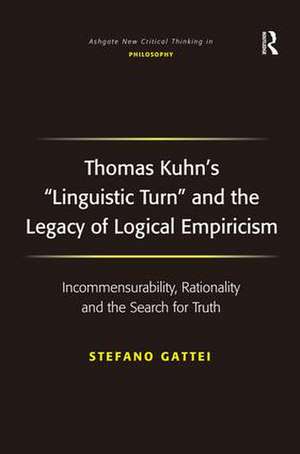Thomas Kuhn's 'Linguistic Turn' and the Legacy of Logical Empiricism: Incommensurability, Rationality and the Search for Truth: Ashgate New Critical Thinking in Philosophy
Autor Stefano Gatteien Limba Engleză Hardback – 28 noi 2008
Din seria Ashgate New Critical Thinking in Philosophy
-
 Preț: 463.28 lei
Preț: 463.28 lei -
 Preț: 489.26 lei
Preț: 489.26 lei -
 Preț: 489.26 lei
Preț: 489.26 lei - 25%
 Preț: 324.16 lei
Preț: 324.16 lei - 16%
 Preț: 338.33 lei
Preț: 338.33 lei - 15%
 Preț: 444.10 lei
Preț: 444.10 lei - 18%
 Preț: 997.38 lei
Preț: 997.38 lei -
 Preț: 469.34 lei
Preț: 469.34 lei -
 Preț: 469.34 lei
Preț: 469.34 lei - 16%
 Preț: 299.06 lei
Preț: 299.06 lei -
 Preț: 469.34 lei
Preț: 469.34 lei - 17%
 Preț: 233.51 lei
Preț: 233.51 lei -
 Preț: 469.34 lei
Preț: 469.34 lei - 26%
 Preț: 765.04 lei
Preț: 765.04 lei -
 Preț: 489.26 lei
Preț: 489.26 lei -
 Preț: 469.34 lei
Preț: 469.34 lei - 26%
 Preț: 736.69 lei
Preț: 736.69 lei -
 Preț: 389.38 lei
Preț: 389.38 lei -
 Preț: 469.34 lei
Preț: 469.34 lei -
 Preț: 469.34 lei
Preț: 469.34 lei - 26%
 Preț: 764.20 lei
Preț: 764.20 lei - 13%
 Preț: 338.33 lei
Preț: 338.33 lei - 13%
 Preț: 338.33 lei
Preț: 338.33 lei - 12%
 Preț: 312.43 lei
Preț: 312.43 lei - 18%
 Preț: 1000.27 lei
Preț: 1000.27 lei - 28%
 Preț: 739.02 lei
Preț: 739.02 lei -
 Preț: 489.26 lei
Preț: 489.26 lei -
 Preț: 480.40 lei
Preț: 480.40 lei
Preț: 1000.27 lei
Preț vechi: 1219.84 lei
-18% Nou
Puncte Express: 1500
Preț estimativ în valută:
191.40€ • 200.37$ • 158.37£
191.40€ • 200.37$ • 158.37£
Carte tipărită la comandă
Livrare economică 05-19 aprilie
Preluare comenzi: 021 569.72.76
Specificații
ISBN-13: 9780754661603
ISBN-10: 0754661601
Pagini: 292
Dimensiuni: 156 x 234 x 18 mm
Greutate: 0.45 kg
Ediția:1Adnotată
Editura: Taylor & Francis
Colecția Routledge
Seria Ashgate New Critical Thinking in Philosophy
Locul publicării:Oxford, United Kingdom
ISBN-10: 0754661601
Pagini: 292
Dimensiuni: 156 x 234 x 18 mm
Greutate: 0.45 kg
Ediția:1Adnotată
Editura: Taylor & Francis
Colecția Routledge
Seria Ashgate New Critical Thinking in Philosophy
Locul publicării:Oxford, United Kingdom
Cuprins
Contents: Preface; Two revolutions in 20th century philosophy of science; Kuhn and the 'new philosophy of science'; Incommensurability; Kuhn's 'linguistic turn'; The shadow of positivism; Bibliography; Index.
Recenzii
’This book is written by a philosopher who understands the issues and the nuances of key ideas, and who has also taken time to engage with the material from an historical perspective... All in all an insightful read for anyone interested in the question of incommensurability.’ Metapsychology ’... Gattei has written a book that sets a standard on scholarship on Kuhn’s work.’ Philosophy in Review 'Thomas Kuhn's 'Linguistic Turn' and the Legacy of Logical Empiricism, which stems from Gattei’s doctoral dissertation, will be of wider interest to historians with a side interest in the philosophy of science itself or in one strand of the intellectual response to science and culture in the tumultuous twentieth century - and to anyone seeking an answer to the question ’Whatever happened to Thomas Kuhn?’.' ISIS
Notă biografică
Stefano Gattei researches the history and philosophy of science at the University of Pisa. He is the author of several books and articles, including La rivoluzione incompiuta di Thomas Kuhn (Turin: UTET, 2007), Introduzione a Popper (Rome-Bari: Laterza, 2008) and Karl Popper's Philosophy of Science: Rationality without Foundations (Routledge, New York). He is currently working on a reader's guide to Popper's The Logic of Scientific Discovery for Continuum Press, New York, and, together with Joseph Agassi, he is editing Physics and Philosophy, the fourth volume of Feyerabend's philosophical papers for Cambridge University Press. He also has in preparation an annotated critical edition of Kepler's Strena seu De nive sexangula (1611).
Descriere
Presenting a critical history of the philosophy of science in the twentieth century, focusing on the transition from logical positivism in its first half to the "new philosophy of science" in its second, Stefano Gattei examines the influence of several key figures, but the main focus of the book are Thomas Kuhn and Karl Popper. Gattei makes two important claims about the development of the philosophy of science in the twentieth century; that Kuhn is much closer to positivism than many have supposed, failing to solve the crisis of neopostivism, and that Popper, in responding to the deeper crisis of foundationalism that spans the whole of the Western philosophical tradition, ultimately shows what is untenable in Kuhn's view.
